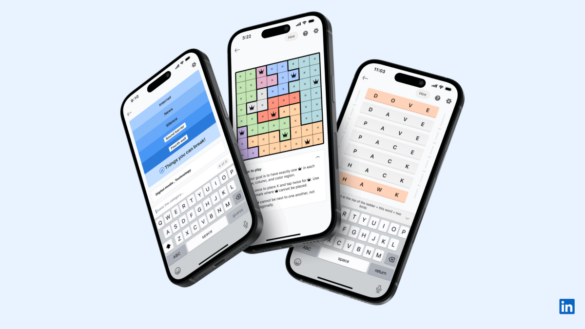The Unexpected Appeal of LinkedIn’s Video Games
Table of Contents
- The Unexpected Appeal of LinkedIn’s Video Games
- Wait, LinkedIn Has Video Games?
- The Gaming Boom: From News to Streaming
- The Science Behind Our Love for Brain Teasers
- The Unexpected Benefits of Gaming: From Stress Relief to Social Connection
- A New Frontier in Mental Wellness
- The Neuroscience Behind Gaming’s Impact
- The Rise of Finite Gaming Experiences
- Gaming: A Catalyst for Social Connection?
My guilty pleasure isn’t binge-watching “Glee” (even the questionable later seasons) or getting lost in a world of Harry Potter fan fiction. It’s something far more unexpected: I play LinkedIn’s video games.
Wait, LinkedIn Has Video Games?
Yes, you read that right! In May, LinkedIn launched three puzzles through LinkedIn News, reminiscent of the popular New York Times games. There’s Queens, a logic puzzle that has quickly become my favorite, Crossclimb, a word game that offers a decent challenge, and Pinpoint, a word-association game that’s not quite as captivating but still enjoyable.
LinkedIn’s foray into gaming might seem peculiar at first glance. After all, it’s a platform primarily known for professional networking. However, this move isn’t entirely surprising. Tech companies often observe successful strategies employed by others and attempt to replicate them. The New York Times Games has undoubtedly sparked inspiration, as the publication has effectively transformed itself into a gaming powerhouse. By December 2023, users were spending more time on the NYT Games app than on its news app, demonstrating the immense popularity of this format.
The Gaming Boom: From News to Streaming
LinkedIn isn’t alone in embracing the gaming trend. Apple News, Netflix, and even YouTube have all integrated games into their platforms. The gaming landscape is rapidly evolving, with companies recognizing the potential for engagement and user retention through interactive content.
While I find myself drawn to the daily challenges offered by NYT Games, LinkedIn’s offerings provide a satisfying dopamine rush when I need a quick mental break during my workday. Sometimes, after fact-checking information or researching sources on LinkedIn, I’ll indulge in a few rounds of Crossclimb. Other times, when staring at a stubborn draft for too long, solving a colorful Queens puzzle helps clear my head and allows me to return to the task with renewed focus.
There’s a fascinating scientific explanation behind our fascination with these quick, daily brain teasers. Research suggests that engaging in mentally stimulating activities like puzzles can:
- Improve cognitive function and memory
- Reduce stress and anxiety
- Boost creativity and problem-solving skills
Perhaps this is why we find ourselves drawn to these games, seeking a mental workout that leaves us feeling refreshed and accomplished.
A New Frontier in Mental Wellness
In recent years, the gaming industry has exploded, captivating millions worldwide with immersive worlds and engaging narratives. But beyond entertainment, a growing body of research suggests that video games can offer surprising benefits for mental well-being. DeepWell DTx co-founder Ryan Douglas, whose firm specializes in therapeutic video game development tools, believes that even brief bursts of gameplay can provide psychological advantages.
“Engaging with a video game can act as a temporary distraction from negative thought patterns,” Douglas explains. “It allows us to step away from rumination and approach challenges from a fresh perspective.” This concept aligns with the growing understanding of how mindfulness practices, such as meditation, can help manage stress and anxiety by shifting our focus to the present moment.
The Neuroscience Behind Gaming’s Impact
On a neurological level, gaming activates the limbic system, the brain region responsible for processing emotions and regulating stress responses. Even simulated stressors encountered in games can train our brains to cope with challenges more effectively. As Douglas points out, “By navigating these virtual challenges, we unconsciously create new neural pathways and learn to manage stress in diverse ways. This fosters a sense of agency and control over our emotional well-being.”
The Rise of Finite Gaming Experiences
This emphasis on controlled gaming experiences is reflected in the popularity of games like Wordle and other similar offerings from The New York Times (and LinkedIn). These games provide a finite challenge, encouraging focused engagement without demanding constant attention. Josh Wardle, the creator of Wordle, spoke to TheTrendyType about his viral success, emphasizing his intention to create an experience that didn’t exploit users’ time and attention.
“I believe people crave experiences that are transparent and respectful of their time,” Wardle stated. “Games that don’t demand constant engagement can be incredibly satisfying.” This sentiment resonates with a growing number of individuals seeking mindful and intentional digital interactions.
Interestingly, even platforms like LinkedIn, traditionally focused on professional networking, are incorporating games into their ecosystem. According to LinkedIn’s internal data, new player engagement has surged by 20% week over week since July. The platform has also observed increased user interaction following gameplay sessions, suggesting that gaming can foster a sense of community and shared experience.
While the impact of gaming on social connection remains an area of ongoing exploration, it’s clear that video games are evolving beyond mere entertainment. They offer a unique blend of cognitive stimulation, emotional regulation, and social interaction, holding immense potential for enhancing our well-being in the digital age.


